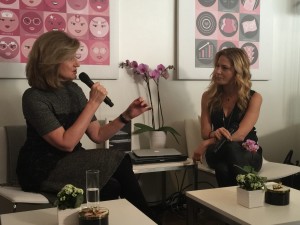Last week Francis Cholle spoke at The Girls’ Lounge (www.thegirlslounge.com) at Davos addressing The Female Quotient and why embracing feminine values is the key to success in the 21st century. He introduced a project The Human Company is co-creating called Skirting the Rules (www.skirtingtherules.com), which is a social enterprise that frees women—and men—to create a culture elevating feminine values to manifest a more balanced and purposeful world.
 Francis and The Human Company are co-authoring this movement and a book along with Deborah Burns, president of DLB Ventures and former client of ours, to help women recognize and validate feminine values that are the key to success in the 21st century, including receptivity, creativity, empathy, openness, and inclusivity.
Francis and The Human Company are co-authoring this movement and a book along with Deborah Burns, president of DLB Ventures and former client of ours, to help women recognize and validate feminine values that are the key to success in the 21st century, including receptivity, creativity, empathy, openness, and inclusivity.
The speakers at The Girls’ Lounge included:
Laura Liswood, Secretary General, The Council of Women World Leaderships
John Gerzema, CEO of BAV and NY Times best selling author The Athena Doctrine
Arianna Huffington, President and Editor-in-Chief at The Huffington Post
Amanda Ellis, New Zealand Ambassador to the UN
Michel Morelli, Vice-President, Business & Consumer Marketing, AOL
Micheale Roth, CEO of IPG
Carolyn Everson, VP Global Solutions, Facebook
The Girls’ Lounge at Davos had 3 objectives:
– to be a destination for the 18% of the year’s attendees that are women (sadly we wish this number were much higher, but it seems indicative of global trends).
– to allow for productive conversations in the intimacy of a lounge designed by women for women and facilitate relationships to develop collaboration and toolkits for change.
– to ask and record influential women about their legacy and commitments when it comes to gender equality (starting a legacy series).
We believe the 21st century is about integrating all that is feminine into the current masculine hierarchical structures that permeate most of our societies. Please note that when we talk about “feminine” and “masculine” we’re talking about energies or archetypes—such as in yin and yang—both men and women have some form of feminine and masculine energies. And both women and men can cultivate these two energies. Success in the 21st century will require keeping in mind what each energy represents and how they complement (and can’t exist without) each other.
This discussion is heading the direction of what we call Gender Intelligence, really being fluent in both a feminine and a masculine mindset and being able to move easily between them as necessary.
The question is: How do you get Gender Intelligence? Because wanting to understand someone else’s point of view and having the skills to stand in someone else’s shoes, tolerate what you see, take it in, learn from it, and take positive action are entirely different things. We see this repeatedly in our domestic politics, in horrifying domestic and international events, and honestly, in our own offices and homes.
We’re going to do a series of blog posts about Gender Intelligence and how to develop it. Business research shows that the best way to innovate is to focus on people and culture. So in our blog posts we will focus on changing culture and helping people train to change perceptions, beliefs and behavior and to create diversity and inclusion of both men and women, feminine and masculine values. And while making the case for gender parity in the workplace is a moral issue, it turns out that hiring women is a truly sound business practice. The reason at the core of it: diversity. The broader the range of opinions, backgrounds and experience contributing to an organization, the richer the foundation to draw from and the more likely a project it is to succeed. This is the case for startups, high-tech ventures and multinational corporations.
Some key statistics from Joann Krotz’s recent release Being Equal Doesn’t Mean Being the Same:
- Women-led, venture-backed high-tech companies used about a third less capital and averaged 12% higher annual revenues compared to similar startups run by men.
- Women-led startups show lower failure rates than those led by their male counterparts.
- Multinational corporations with the most women on their boards reported a 26% higher return.
- McKinsey & Company found that operating profits were 56% higher at international companies with the most women board directors.
At the Human Company, we’ve developed a tool called the Intuitive Compass® that diagnoses how masculine and feminine energies are being used in a particular situation. To go with it, we’ve developed a mindset called Intuitive Intelligence (closely linked to Gender Intelligence) that can be used to develop skill at navigating between the two energies. You can check out a previous post on the Intuitive Compass here.
We look forward to continuing this timely, essential conversation.
